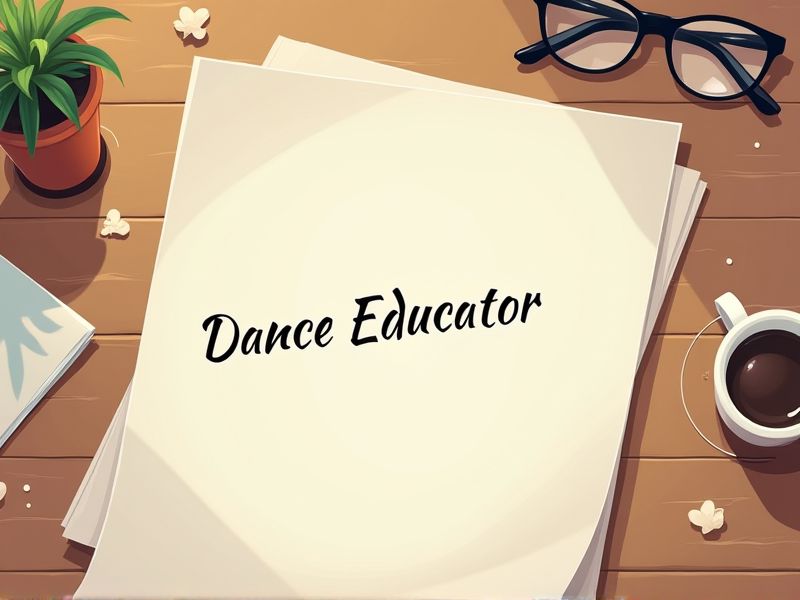
Dance educators require specific certifications to ensure they possess the necessary skills for both dance instruction and student safety. These certifications often cover areas such as anatomy, to prevent injuries, and pedagogy, to optimize teaching effectiveness. Certification also establishes credibility, increasing employability and trust within the professional community. Essential certifications you may need for a career in dance education include those related to these crucial areas.
State Dance Teaching Credential
The State Dance Teaching Credential ensures that dance educators possess a standardized level of knowledge and skills necessary to provide high-quality instruction. It increases the credibility and professional recognition of dance educators, which can lead to more job opportunities and career advancement. It mandates continuous professional development, ensuring that educators stay updated with the latest teaching methods and dance trends. It aligns with educational standards, which helps integrate dance more effectively into school curricula, benefiting students' overall education.
National Certified Dance Educator (NCDE)
National Certified Dance Educator (NCDE) ensures standardized training, promoting consistent quality in dance education. Certified educators gain recognition, enhancing their professional credibility and career opportunities. Students benefit from well-rounded instruction, as certified educators often possess a comprehensive understanding of diverse dance styles and techniques. Certification encourages continual professional development, keeping educators current with evolving dance trends and pedagogical methods.
Dance Pedagogy Certification
Dance pedagogy certification equips educators with a structured framework for teaching, which enhances student learning outcomes. It provides educators with methodologies and best practices that ensure consistent, high-quality instruction. Certification validates expertise, appealing to institutions seeking credible and qualified instructors. Access to a network of professionals and ongoing professional development opportunities is often part of certification programs, keeping educators updated on industry trends.
K-12 Arts Education Endorsement
K-12 Arts Education Endorsement provides dance educators with comprehensive knowledge in educational pedagogy, which enhances their teaching effectiveness in diverse classroom settings. It ensures educators meet state standards, making them more competitive and qualified in the job market. With an endorsement, dance educators can access a wider range of teaching positions, increasing job security and professional growth opportunities. Research indicates that students benefit significantly from arts education in terms of cognitive and social-emotional development, making the role of a well-trained dance educator crucial in the education system.
CPR and First Aid Certification
Dance educators frequently encounter physical injuries among students due to the demanding movements involved, making CPR and First Aid Certification essential for immediate response. Rapid intervention with certified skills reduces the risk of severe injuries by addressing issues like sprains, fractures, and falls promptly. Training in CPR equips educators to handle unexpected cardiac emergencies, minimizing potential health risks during high-intensity sessions. Possessing these certifications enhances the educator's credibility and ensures a safer learning environment, reassuring students and their families.
Adaptive Dance Education Certification
Adaptive Dance Education Certification equips dance educators with skills tailored to diverse learners, facilitating inclusive environments. Certification ensures educators understand specific needs, fostering positive experiences for students with disabilities. Better understanding of adaptive techniques leads to improved student outcomes and engagement. Certification enhances educator credibility, potentially increasing career opportunities and program funding.
Youth Dance Instruction Certificate
A Youth Dance Instruction Certificate provides dance educators with verified skills in teaching and handling young learners, enhancing their professional credibility. Obtaining the certificate often correlates with a deeper understanding of child development psychology, resulting in more effective teaching strategies tailored to younger age groups. Certified instructors are perceived as more competent and trustworthy, increasing their opportunities for employment and collaboration. Accreditation standards require an understanding of safety protocols, ensuring a safer environment for students during dance activities.
Cultural Dance Studies Certification
Dance educators who pursue a Cultural Dance Studies Certification gain a structured understanding of diverse dance forms, leading to a more inclusive curriculum. This certification often results in educators being better equipped to appreciate and teach the historical and cultural contexts of various dance traditions. Students benefit from exposure to a wider range of dance styles, fostering cultural sensitivity and diversity awareness. Schools and educational institutions may also enhance their reputation as they offer a more comprehensive dance education program, meeting the growing demands for cultural inclusivity in the arts.
Choreography and Performance Training Certificate
A Choreography and Performance Training Certificate enhances a dance educator's ability to create innovative dance routines, which directly influences the quality of their teaching. It provides educators with structured techniques that improve their students' skills and performance outcomes. Formal certification can lead to increased credibility, making educators more competitive in the dance industry. The program often includes exposure to diverse dance styles, broadening an educator's scope and enriching the learning experience they offer to students.
Professional Development in Dance Education Certification
Professional development in dance education certification equips educators with advanced pedagogical skills, enhancing their teaching effectiveness. Updated knowledge in dance techniques and trends allows educators to stay relevant and inspire students with current practices. Certification fosters recognition and credibility within the industry, leading to better opportunities and collaboration. Ongoing professional development also supports personal growth, resulting in a more engaged and motivated educational environment.
Summary
When you pursue certifications as a dance educator, your teaching credentials enhance significantly, boosting your credibility and marketability. This leads to higher demand in various institutions and potentially increased income. Students often benefit from more structured and effective learning experiences, resulting in improved performance. Consequently, the dance community witnesses elevated standards and engagement levels, driving further growth.
